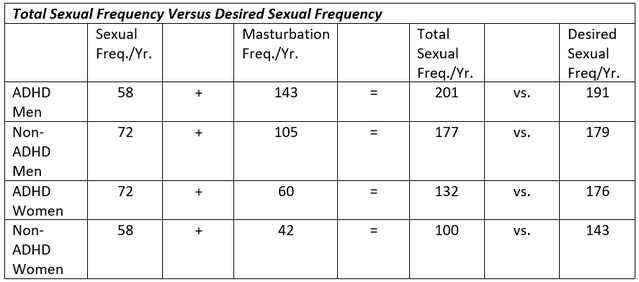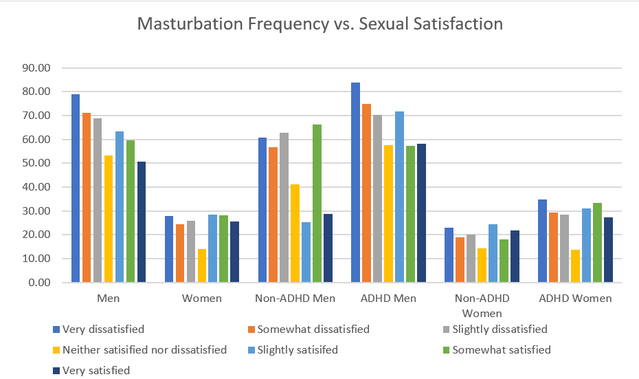Masturbation
Men Masturbate to Make Up the Difference—But Women Don't
Masturbation can serve different roles for men and women.
Posted May 31, 2017 Reviewed by Gary Drevitch
The always interesting David Ley recently posted about a study looking at how masturbation frequency relates to the frequency of partnered sexual activity (Masturbation and Marriage). As he writes:
“Two main theories have been promoted about the relationship between masturbation and partnered sex. The complementary theory proposes that people masturbate within a relationship in order to enhance their partnered sex. So, masturbation might increase and improve the partnered sex. In contrast, the compensatory model suggests that people in relationships masturbate as a means to substitute for sexual desires (whether in quantity, quality or type) that go unmet within the relationship.”
What was unique about the Regnerus, Price & Gordon (2017) study is that they added the variable of how content participants were with their sexual frequency, rather than simply how often they had sex. If you’re having sex twice a week and are happy about it, you may have less of a desire for masturbation than if you would like to have sex four times a week. (Seems like a pretty important variable to add, right?) The studies that didn’t consider satisfaction with sexual frequency seem to implicitly assume that everyone wants about the same amount of sex, which is not the case.
Hopefully not as surprisingly, the study found that it does indeed matter how satisfied you are with your sexual frequency, not just how often you’re having sex. And they found a big gender difference: Men tended to masturbate in a compensatory way, using it to make up for the desired sex that they aren’t getting. Meanwhile, women tended to masturbate in more of a complementary way—the more sex they had, the more they masturbated; one primed the pump for the other. Obviously, these are group averages, so there are individual differences, but the trends were there.
In this post, I’d like to share some of my own research data and some thoughts about the implications. To better understand the relationships and sex lives of couples in which one person has ADHD and one doesn’t, I created an online survey that got over 3,000 respondents. Some of that data bears directly on what the Regnerus study examined, as shown in Table 1, below.

It is amazing how closely the men’s total sexual frequency matches their desired sexual frequency—they are clearly using masturbation in a compensatory way. By contrast, women desire less frequent sex and also masturbate much less, so they are falling about 25 to 30 percent below their desired total frequency.
I then compared masturbation frequency with sexual satisfaction in order to bring in this key variable from the Regnerus study, which you can see in Table 2, below. (The totals are half that of Table 1 because in this case it is per half year.)

As Regnerus predicts, less sexually satisfied men masturbate more while more satisfied men masturbate less. The difference for women, though, was pretty flat—in my data, sexual satisfaction didn’t seem to make much difference. A separate analysis found that the difference between desired and actual sexual frequency was a significant contributor to sexual satisfaction, but there were also other significant variables, so it may be that those other variables play a bigger role for women than for men. Therefore, masturbation may not serve the same purpose for both genders when it comes to its relationship to sexual satisfaction. (Incidentally, I suspect that the reason why those who are neither satisfied nor dissatisfied masturbate the least is that they perhaps have less desire for sex, whether partnered or solo.)
Are Sex and Masturbation the Same?
Both partnered sex and masturbation tend to lead to orgasms (but don’t have to), so men seem to use masturbation as a way to make up for the orgasms they aren’t having with their partner, more so than women do. Regardless of orgasms, we should keep in mind that partnered sexual activities and solo ones can offer different experiences and may serve different purposes. This may be more true for women than men, but just because men seem to substitute masturbation for partnered activities on a one-to-one basis doesn’t mean that they view them as equivalent. After all, I might order pasta if the restaurant is out of chicken, and enjoy it as well, but that doesn’t mean that they are equivalent in my mind.
Another noteworthy finding is that, although there is large individual variability, most people masturbate at least sometimes, regardless of gender or how satisfied or dissatisfied they are with their partnered sex life. While this may simply reflect times when a partner isn’t available to scratch that itch, it more likely also suggests that partnered and solo activities meet different needs—again, they’re both great, just not the same.
So, if you are happy with your sex life, then perhaps your partner’s masturbation isn’t something to make an issue of. This is especially true if you’re a guy who wants more sex with your female partner: The Regnerus study tells us that you should be happy about her masturbating since it probably increases, rather than drains away, her desire to do things with you.
Having said that, if your sex life is struggling, masturbation can be used as the path of least resistance to meet one’s sexual needs rather than the perhaps more complicated task of addressing what is getting in the way of sex with your partner. Masturbation can also be the path of least resistance if it is blamed for sexual problems in the relationship, as a scapegoat to avoid dealing with other issues getting in the way. Masturbation may be more the result than the cause of a lack of sex.
It may be worth spending some time thinking about how masturbation fits into your overall sex life and relationship, and then talking with your partner about it:
- How is masturbation similar or different from partnered activities?
- Does your partner know about your solo activities—how often, where, when, why, and what you do? If not, why not? Would it be better if they did?
- What do you know about your partner’s solo activities? How do you feel about it? Would you like to know more?
- What can you and your partner do in relation to masturbation to improve overall sexual satisfaction for both of you?
I’d like to thank David Ley, Ph.D for a really interesting email exchange about this topic. I encourage you to check out his blog.




